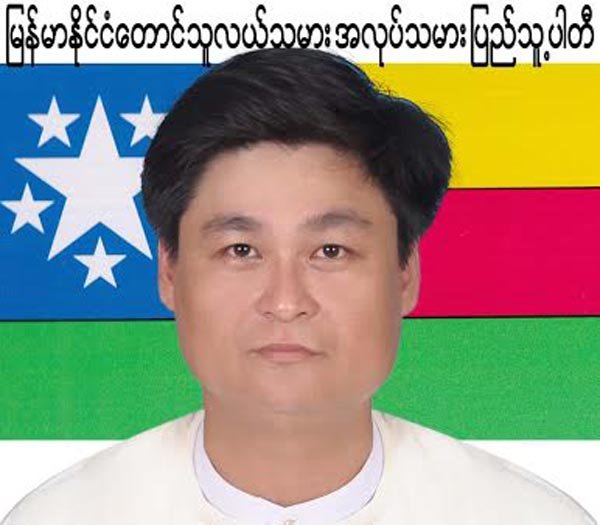A new political party – the Myanmar Peasants, Workers, People’s Party – was on 9 December was given a green light to register with the Union Election Commission. DVB interviewed the party’s general secretary, Aung Myo Khine, regarding their aims, policies and plans for the future to promote labour and farmer rights.
Q: We learnt that your party has been approved to register. Will you only campaign in Irrawaddy Division or do you plan to address national politics?
A: We founded our party with an aim to serve the interests of the country, so we will be campaigning nationwide. Our headquarters are in Irrawaddy Division’s Bassein.
Q: We see that we used the words ‘Peasants’ and ‘Workers’ in your title. Why did you choose to focus on those two groups?
A: Because farmers and workers are the poorest and most vulnerable people in Burma, but at the same time they are the main driving force for our country’s development. We aim to serve the interests of all the people of Burma, while representing the workers and peasants.
Q: What are your party policies? Can you give us a summary?
A: As for policies, we presented quite a few to the Union Election Commission, including the importance of a disciplined and educated democratic system, and generating an all-inclusive political environment with a government whose main focus is the people. We aim to make this representative of all farmers and workers in the country.
We also aim to serve in our best capacity to bring about a transparent, independent and fair judicial system, and amend the farmland and labour laws to ensure fairness and rule of law. We see that it is necessary to have a free and fair judicial system supported by impartial laws, and Rule of Law must be implemented to ensure these laws are applied.
We also want to work in our best capacity towards maintaining the country’s peace-making process; adopt peaceful and unbiased political policies in dealing with neighbouring countries and trade partners; ensure a smooth democratic transitional period; and overcome challenges through negotiations rather than attacking one another.
Q: It’s safe to say yours is the first party that represents the working community in Burma. What labour issue do you think should be prioritised?
A: The livelihood, economy, education and health standards of workers in Burma – compared to their counterparts in other countries – is very low. Also, we have a percentage of unemployed people in the country and those who have jobs do not earn enough to sustain their livelihoods. In terms of their education, we have only seen rather weak support from the government and Non-Government Organisations. We plan to do what we can do contribute to these sectors through cooperation with international organisations, the government and civil society groups.
We learnt that there are around six million Burmese migrant workers overseas, who are often subjected to discrimination. As a party representing the working community in Burma, we will work together with civil society organisations, the ILO and others to promote their rights.
Q: Regarding the farmers who make up majority of the population in Burma, what would you prioritise?
A: The socio-economic standards of Burmese farmers, as well as education and health, are low. Burmese farmers are losing their rights to land ownership. When we look at the ratio of land ownership between the farmers who are actually working the land, and businessmen and those with official links, it is clear that we need to demand a higher percentage of direct land ownership for the farmers.
Moreover, it is very necessary to provide the farmers with technical assistance to allow them to make use of mechanised farming tools. The farmers often have to rely on loan sharks and the government’s agriculture loan scheme to grow crops as they don’t have much money to invest and get caught up in this repeating cycle of loans and debts without any improvement to their lives. We will work together with organisations representing farmers to find an answer to these woes, provide any assistance we can, and restore justice.
Q: As for the party’s leaders? What are their political backgrounds? And who will be the party’s chair?
A: Previously, we only focused on social activities outside of party politics. This is my first experience in a political party. Now that our registration has been approved, we are working to form our Central Executive Committee, and for now we are appointing Dr Aung Phyo as the party’s chair. I will assume the role as general secretary. We will announce the names of 27 central executive members when we get approval from the UEC.
Q: Where do you plan to compete in the 2015 elections? In how many constituencies will you field candidates?
A: We are looking to focus competing in Irrawaddy Division as our stronghold, followed by Pegu and Rangoon. As we just formed the party, we have not yet decided how many constituencies we will compete for in the 2015 elections, but we are aiming about at least five.
Q: Is there anything else you would like to add?
A: The aim of our party is to provide for the interests of the country’s political, economic, education and health sectors as servants of the country, and we are determined to serve to the best of our capacity.



